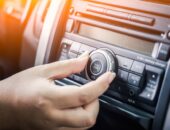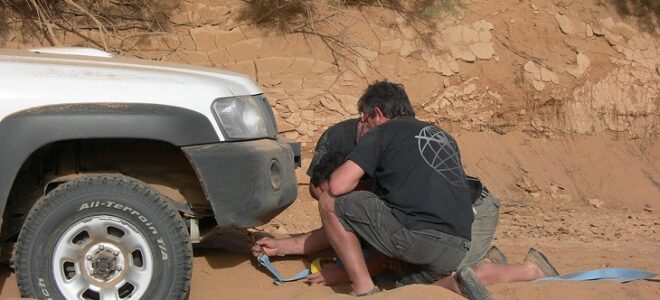
From professional towing companies to off-road enthusiasts, we all know how life-saving having a set of two lines can be! However, professionals and hobbyists alike will also know just how many different situations you can find your vehicle stuck in. Mud, snow, ditches, and odd angles can all spell disaster for one tow line and a job done fast.
Knowing the difference between tow chain and straps is integral to ensuring you are safely recovering a vehicle. Mytee Products carry high-quality towing chains & supplies for quick, safe and effective towing. Understanding the variety of towing accessories available and the situations they work best in is important, and could be the difference between a successful recovery and a damaged vehicle or driver.
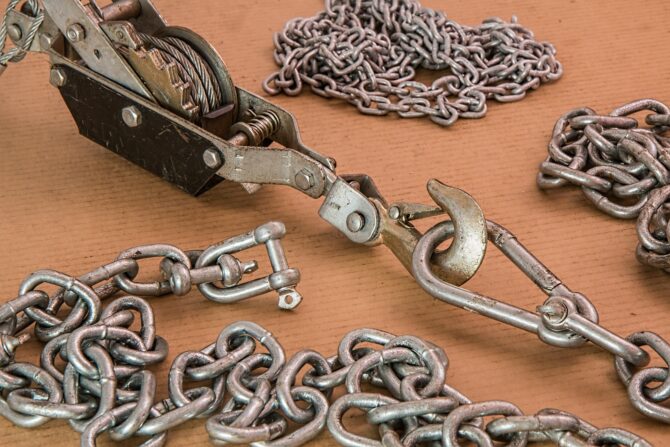
Source: motorhome-buyer.com
Tow Chains Vs Tow Straps
When it comes down to it, the most common tow lines you will find on the market will be tow chains and tow straps. While one may consider the “right” choice to be one of preference, there are actually several important factors to consider when choosing a tow line. Additionally, you may find yourself in need of neither a chain or strap in specific situations – the use of tow ropes and cables should also be considered when choosing how to recovery a vehicle:
Tow Chains
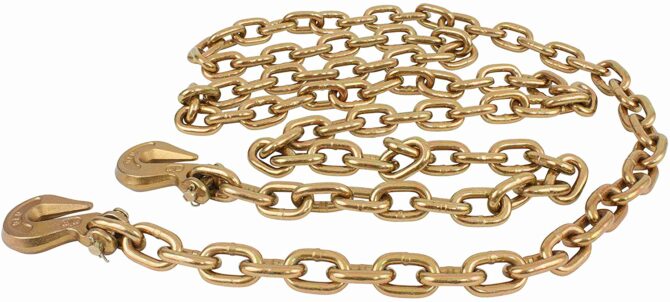
Pros of Towing Chain
- Chains are strong, durable, and abrasion resistant.
- Versatile, coming in a variety of lengths, sizes, and grades.
- Cost-effective, high-quality chains will last you years of good use when used and stored properly.
- Tow chains are extremely resilient, holding up through wear and tear that would otherwise ruin a strap, cable, or rope.
Cons of Towing Chain
- The size and weight of tow chains varies depending on the grade you need to get the job done. Larger grade chains will end up being heavier and bulkier to carry and store.
- Flexibility isn’t in the cards for many tow chains. While the length of a chain can provide more length to work with or around a vehicle or cargo, it can be too easy to twist a chain the wrong way during towing and create unnecessary stress or tension on a link.
- Tow chains can be incredibly dangerous when they’re damaged. A single weak link can break a whole line; which can cause damage to the vehicles and injury to anyone nearby.
- Chains weather with age, and while most chains will be rust-resistant to things like water and weather conditions, as chains get used more, the more wear and tear a chain will endure.
What Are Tow Chains Used For?
Tow chains are most commonly used during the process of towing, recovering, and lifting vehicles or cargo. Strong and durable, they work best when lifting or pulling heavy loads and vehicles that could otherwise snap or tear a tow strap. Any job that requires a lot of abrasion resistance due to the tow line being dragged along the ground or that needs the least amount of stretch possible from the tow line should be where tow chains are adequately used.
Popular Tow Chain Types
Tow chains are always up for recovery tasks that benefit from a strong, abrasion-resistant tow line, compared to other towing options that would work poorly or become damaged from being dragged across uneven terrain. Tow chains are typically made of rust-resistant steel or alloy links and are available in a variety of lengths, sizes, and grades.
Traditionally, towing chains will come in Grades 70 and above, with each increase in grade corresponding to a higher level of strength – some tow chains being able to pull up to 280,000lbs! However, keep in mind the weight will increase with the grade of chain, so ensure the vehicle you will be towing with can handle the weight of your tow chain.
Tow Straps
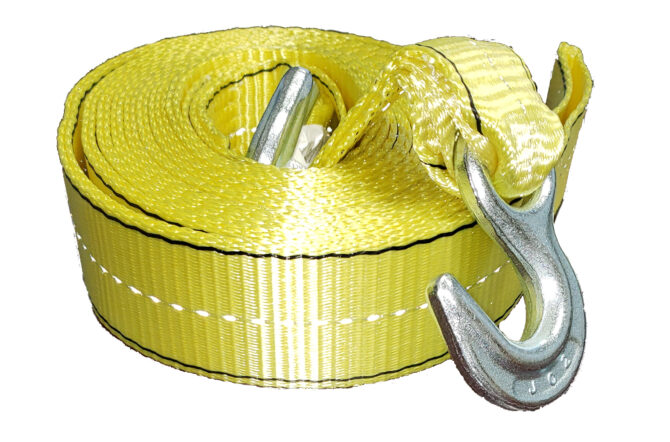
Source: walmart.com
Pros of Towing Straps
- Lightweight – Tow straps have grown in popularity as they are easy to use and maneuver due to being lightweight.
- Compact – Tow straps are much more flexible than tow chains, and can be easily stored and hidden out of sight in small, compact storage areas.
- Weatherproof – Never worry about metal rusting or becoming slick during wet and rainy weather. The durable fabric of a tow strap won’t rust or damage from water or UV rays!
- Flexible – Thanks to the material it’s made of, tow straps have a slight stretch to help pull and recover vehicles without damaging them. This flexibility allows more stress to be evenly distributed throughout the strap, instead of in one spot which can increase the chances of damage.
Cons of Towing Straps
- Unlike chains, fabric is much easier to wear and tear or fray after use. Where chains become dangerous due to one weak link, a strap will become dangerous to use the moment any part of it becomes frayed, torn, or ripped.
- When towing, tow straps can make controlling the vehicle difficult due to swaying. Because of the flexibility and stretch, using tow straps could mean giving up some control of the vehicle behind your towing vehicle.
- Two straps are naturally less abrasion resistant than metal chains. This means things like sharp debris and rough or sharp edges on cargo have the risk of damaging the fabric of the strap, which could cause it to snap or tear down the road.
Tow Straps Use For?
Tow straps are commonly used for towing freewheel vehicles and hauling them to even terrain, repair shops, or residential homes. Straps are designed to provide a steady pull to a towed vehicle without creating any jerking motions.
The natural stretch of a tow strap’s fabric provides less tension and stress between the tow line and the two vehicles. Tow straps are best known for providing high strength with a little bit of stretch to prevent any damage from occurring to the vehicles.
Popular Tow Straps Type
Tow straps are incredibly versatile and popular tow lines used by professionals and hobbyists alike! Made from polyester, polypropylene, or Dacron materials, tow straps have an impressive strength while remaining lightweight and flexible towing options. Tow straps are designed to give very little stretch, and high-quality, stiff straps provide the high towing capacity and abrasion resistance you need to get the job done right.
Tow straps can be designed both with and without hooked end-fittings. Hooks can increase the risk of injury and danger should the strap snap, break, or come loose. However, straps that lack a hook end-fitting will have a harder time properly latching onto the undercarriage of a vehicle that needs towing.
Like a tow chain, tow straps come in a variety of sizes and load capacities ranging from 800 pounds to upwards of 35,000! Most tow straps come in lengths of 20 feet, which typically provides enough length between the towing vehicle and towed vehicle – however, these straps are available in an abundance of sizes guaranteed to fit the job.
Other Towing Accessories Options
Tow Rope
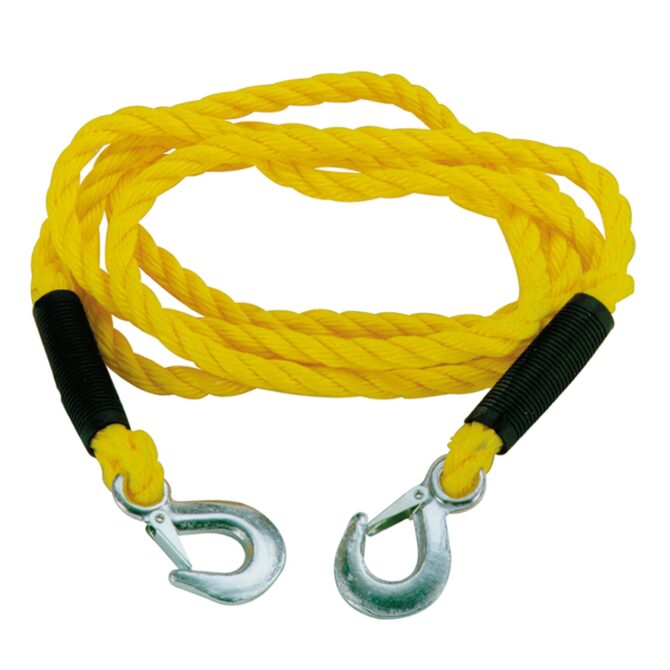
Source: servicebest.com
Tow chains and tow straps are not your only options, however! Tow ropes, for example, are used for a wide variety of applications that includes vehicle recovery and tie-down! Made of similar material to tow straps, tow ropes splice together this tough and durable fabric to provide an equal amount of stretch and strength to the rope.
Tow ropes that are designed specifically for recovery may also be referred to as snatch straps or kinetic recovery ropes – they lack hook end-fittings, however, as the risk of injury due to recoil is much greater with tow ropes than both chains and straps. However, tow ropes are ideal for pulling out a vehicle that’s stuck and needs a steady, controlled tug!
Tow Cables
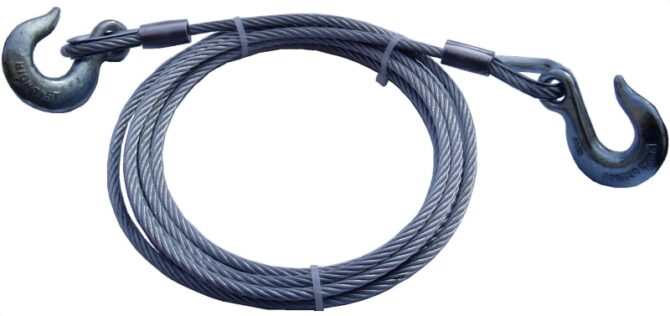
Source: catalog.lexcocable.com
In the same vein, tow cables are heavy-duty wire ropes that are adapted and designed for towing and recovery jobs. Usually made from tough steel or steel alloy, these tow cables can be constructed in a variety of ways; however, standard cables are made of three parts: the core, the wire, and the strands.
For towing cables, there are also three types to consider: Wire Strand Core (WSC), Independent Wire Rope Core (IWRC), and Fiber core cables. Each has their own pros and cons, so make sure you do proper research before investing in one tow cable over the other.
There are many questions you should ask yourself when deciding the best tow line tool to use to get your towing jobs done safely and efficiently:
- What is the size and weight of the vehicle or load you plan to pull?
- How long of a line do you need?
- Do you plan to use the tool exclusively for towing and recovery?
- Do you plan to use a winch?
Having answers to these questions will help you narrow down the best option before you buy: chain, strap, rope, or cable. All of these towing options provide their own sets of advantages and disadvantages, and choosing the right towing tool could be the difference between a tow job done safely and damaged cargo, vehicles, or personnel.
Always make sure you are purchasing the best, high-quality, and reliable equipment on the market. While you could save a few bucks buying a cheaper brand or material, you increase the risk of damages and injury that could cost you more in the long run.



